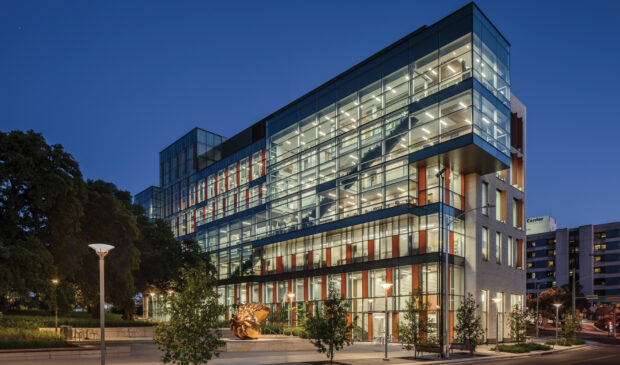Life sciences, housing policy seen as keys for Austin’s five-year growth strategy
Friday, September 8, 2023 by
Chad Swiatecki Business leaders see the life sciences sector as the next major piece of the Austin economy and expect it to grow quickly along with semiconductor and automotive manufacturing, financial services and national defense in the years to come.
Focusing on those industries while addressing housing costs and the growing local labor pool were some of the main priorities for the next version of Opportunity Austin, the 20-year strategy that has helped to roughly double the number of jobs in Austin since 2004. The OA 5.0 plan was revealed to Opportunity Austin members and stakeholders on Wednesday, with an analysis by global consulting firm EY that looked at the region’s economic growth patterns and strengths.
EY’s work resulted in four strategic goals that are expected to keep Austin and the surrounding communities economically strong: making the region more economically diverse, making the area attractive for global investment, providing the labor and intellectual talent that companies need, and improving the local quality of life.
The new plan is the first major initiative from Opportunity Austin since the organization formally split from the Austin Chamber of Commerce earlier this year. Its leaders hope to raise $30 million from the local business community to fund the five-year effort. Gary Farmer, interim CEO of Opportunity Austin, said the burgeoning life sciences innovation district near the Dell Medical School is likely to attract the most attention and investment, with the area already home to 200 life sciences companies.
“We have five distinct verticals and it makes us quite diverse, and that diversity makes us more sustainable,” he said, adding that Round Rock also has a life sciences strategy in its economic development plans. “Out of all those, we think the life sciences could be the next big area for Central Texas, and we hope to showcase that and work on that with diligence.”
While pharmaceutical giant Merck captured attention by receiving and then opting out of an economic incentive program from the city, Farmer said he and others with Opportunity Austin would like to see City Council consider and extend incentives in the form of property tax rebates. He said in recent years many companies besides Merck have opted to withdraw from the city’s incentives because they had requirements that were seen as too rigid.
“I believe incentives are an appropriate tool to create return for taxpayers. Incentives are largely misunderstood by the body politic and I can understand why they would be,” Farmer said. “It’s not that we’re going to pull a sack of cash out of the city’s treasury and say here you go …. It’s saying we will incent you where if you pay us $5 (in taxes), we’ll give you a buck back, but you got to pay us first and we’ll give you a buck back. That’s a 20 percent incentive right now. I’d do that deal all day long.”
The plan’s quality-of-life goal is centered mostly around housing, with the goal of making homes more affordable for middle-income workers and artists who would have to travel crowded roads into Austin if they’re priced out of the city.
Farmer said he and others with the organization approve of the recent analysis by consulting firm McKinsey that identified many of the reasons why Austin’s site plan approval and permitting process takes so long and greatly increases the cost to build new houses and apartments. He also praised the recent changes to the building code to favor more density throughout the city.
“We’re, like, two and a half times more expensive than any of our other sister cities in Texas,” he said. “I’m very pleased that the mayor is focused on that, and I’m very hopeful that something can get done. It’s problematic when the creative economy, the basic services economy, can’t afford to live here. If the musicians can’t afford to live here, the policemen, firemen, EMS, teachers, nurses, chefs, if they can’t afford to live here, they move further away.”
The Austin Monitor’s work is made possible by donations from the community. Though our reporting covers donors from time to time, we are careful to keep business and editorial efforts separate while maintaining transparency. A complete list of donors is available here, and our code of ethics is explained here.
You're a community leader
And we’re honored you look to us for serious, in-depth news. You know a strong community needs local and dedicated watchdog reporting. We’re here for you and that won’t change. Now will you take the powerful next step and support our nonprofit news organization?



